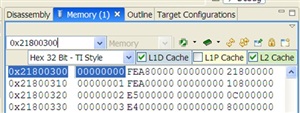hi there
May be someone have similar trouble or can suggest any idea?
Problem description:
After linux host boots, "lspci -n" don't show the TI board. If I push "Full Reset" on TI board several times, then issue "echo 1 > /sys/bus/pci/rescan",
I could see the board:
lspci -v -d 104c:*
01:00.0 Multimedia controller: Texas Instruments Device b005 (rev 01)
Flags: bus master, fast devsel, latency 0, IRQ 16
Memory at 80900000 (32-bit, non-prefetchable) [size=1M]
Memory at 82400000 (32-bit, prefetchable) [size=512K]
Memory at 82000000 (32-bit, prefetchable) [size=4M]
Memory at 81000000 (32-bit, prefetchable) [size=16M]
Memory at 82490000 (32-bit, prefetchable) [size=4K]
Memory at 82480000 (32-bit, prefetchable) [size=64K]
Capabilities: [40] Power Management version 3
Capabilities: [50] MSI: Enable- Count=1/1 Maskable- 64bit+
Capabilities: [70] Express Endpoint, MSI 00
Capabilities: [100] Advanced Error Reporting
The attempt to execute PCIe demo fails (insmod hangs up), the command is "insmod pciedemo.ko".
After some debug I found the exact place where demo hangs:
<pciedemo.c>
#if HELLO_WORLD_DEMO
/* Load DDR init code into DSP */
pushData(ddrInitCode, 0, &bootEntryAddr);
/* Write boot entry address into MAGIC_ADDR */
writeDSPMemory(0, MAGIC_ADDR, &bootEntryAddr, 4);
while (1) {
/* <<<<< Here this demo hangs forever >>>>>*/
readDSPMemory(0, MAGIC_ADDR, buffer, 4);
if (buffer[0] == 0) break;
for (i = 0; i < 1000; i++) i++;
}
/* Load "Hello World" demo into DSP */
pushData(bootCode, 9, &bootEntryAddr);
/* Write boot entry address into MAGIC_ADDR */
writeDSPMemory(0, MAGIC_ADDR, &bootEntryAddr, 4);
#endif
Also any attempt to read from TI device’s memory by means of io-mem returns 0xffffffff. I. e. any pci memory access, directly, or through
linux API ("ioread32()") returns only FFs. But I can read and write all the config space and application registers by means of io-port access.
I. e. linux functions like"pci_read_config_dword()" are works fine.
My conclusion: the inbound address translation or memory access via PCIe is not working, while io-port access to entire PCIe config
space is working, but not stable. I checked all the BAR and IB_XXX register contents, all values were set according to the manual.
Here some details:
Board Name: TMDXEVM6678LE Rev 1.0 / PCB Rev A102-1
Board Serial Number: EPD0061817
Board additions: AMC to PCIe Adapter, BlackHawk XDS560v2 USB Mezzanine
AMC to PCIe S/N: 0058 PCB REV: 17-00107-03 PCA REV: 18-00107-03
DIP switch configuration:
SW3: (off, on, on, off)
SW4: (on, on, on, on)
SW5: (on, on, on, off)
SW6: (off, on, on, on)
SW9: (off/on, on)
Firmware used: MCSDK_02_01_02_06
Linux on the host - tried SuSe 11.3 and Ubuntu 10.2
Board POST test completes succesfully.
I also read and tried all suggestions in
http://e2e.ti.com/support/dsp/c6000_multi-core_dsps/f/639/t/247997.aspx
with no positive result.
Regards,
Dmytro


